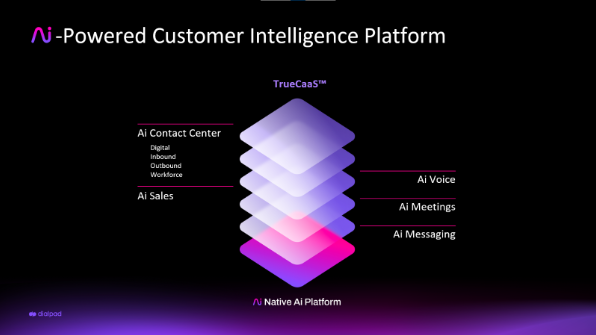Dialpad announced this week it plans to deliver a series of internally developed generative artificial intelligence (AI) advancements to enhance the company’s Ai-Powered Customer Intelligence Platform. The company plans to unroll a new capability on a monthly basis starting this month. One capability will become generally available each month for 12 months beginning with April 2023.
Dialpad Ai-Powered Customer Intelligence Platform is nomenclature that the company debuted in December 2022 to mark the transition of its portfolio toward an approach where native AI will be infused throughout its applications. The product markets Dialpad says are addressed with the Ai-Powered Customer Intelligence Platform are AI, CCaaS, sales enablement and UCaaS – listed by the company in that order likely to connote the relative opportunity of each market segment. In a pre-briefing for industry analysts, Craig Walker, Founder & CEO of Dialpad described the combined addressable market opportunity as over $100 billion. As seen in the graphic below, today Dialpad’s platform delivers Ai Contact Center, Ai Sales, Ai Voice, and Ai Meetings with Ai Messaging.
Native AI
Dialpad’s native AI is technology that came with the acquisition of TalkIQ in 2018. Walker spent several minutes during the briefing expanding on, and answering analyst questions about, what native AI means to the performance and cost of Dialpad applications. The primary advantage of native AI is, “It allows us to provide AI at scale at a very reasonable cost, since we own the technology,” said Walker. “We're not paying another company on a per minute basis,” he continued. The comparison Walker is making here is to CCaaS or UCaaS vendors that are dependent on AI providers like Google, Microsoft, or IBM for services like transcription or translation. According to Walker, Dialpad’s lower cost to provide AI, “gives us the capacity to turn it on for a wide variety of use cases,” implying that because the AI cost is within reason, enterprise customer adoption will warrant broad use of the technology across the suite.
When Dialpad talks about native AI, they mean they are doing their own transcription and speech recognition. They use their own natural language processing and natural language understanding models. And they are building their own large language models leveraging Google Bard and Google Vertex (while also having a partnership with OpenAI.)
Native AI also makes it easier for Dialpad to build and provide tools that allow customers to customize the AI, Walker continued. For example, native AI allows Dialpad to empower customers to create custom dictionaries that are not as quickly or cost-effectively built when a third-party AI vendor is involved.
Dan O’Connell, Dialpad’s Chief Strategy Officer and former CEO and President of TalkIQ, provided additional color on Dialpad’s AI bona fides. “When we talk about AI, this is not something that we're suddenly jumping on the hype train for, but something we’ve been heavily invested in - pioneers in - for nearly a decade,” O’Connell declared. He and his team have been incorporating AI into the Dialpad platform for over five years, having worked on the real-time transcription engine at TalkIQ for over four years prior to the acquisition.
O’Connell stressed an advantage of native AI, ease of use. “Our approach has been very focused on how we make AI easy for businesses to deploy,” he said. Dialpad wants to make sure that AI is there to enhance the experience for every user, whether in sales, in support, a recruiter or even a back-office user. “I think generative AI and large language models open up unique opportunities not just in sales and support centers, but in unified communications in general,” O’Connell continued.
“Ninety-six percent of our contact centers actively use our AI-related features today,” O’Connell reported. “We're not just selling software that nobody leverages.” The features customers use include real-time assist cards and Ai-CSAT. Real-time Assist cards provide triggered pop-ups that guide contact center agents through speaking points, workflows, best practices, etc. And lest one think Dialpad is over-rotating on agent capabilities, O’Connell said, “AI opens up the opportunity to make UCaaS cool again.” How? Keep reading.
First Four Generative AI Announcements
Dialpad believes large language models and AI open up the opportunity to create unique user experiences and product features s, which the company intends to deliver one per month over the course of the next year. In today’s press release, Dialpad defined the first four releases.
- April: Ai Recap leverages generative Ai algorithms and Dialpad’s proprietary natural language processing (NLP) models to generate short summaries that capture the main ideas and topics of a conversation and define the call’s outcome, purpose, and action items stemming from the conversation. Currently, generated summaries are enabled for all Dialpad calls and meetings if AI is enabled. Ai Recap is available now.
- May: Ai Scorecards will offer quality management review of 100% of interactions, often referred to as automated quality management. Ai Scorecards will provide immediate insight into coaching opportunities and allow for real-time feedback to agents. The consistency of the quality management operation is assured as all interactions are reviewed, not just a subset chosen by the system or supervisor.
- June: Coaching Hub will leverage AI to uncover which team members need help the most and with which skills. Often, coaching platforms rely on post-call recordings and transcriptions which delays analysis and feedback. Dialpad’s Ai Coaching Hub will be a real-time coaching platform for users and supervisors as calls take place.
- July: Ai Playbooks will provide agents, sales professionals, and recruiters with real-time guidance and tracking against predetermined sales processes and questions they are expected to ask, to help ensure consistent processes are leveraged across teams while reminding users of what to focus on in a call and the next best action to take. Following the call, the technology aggregates post-call reporting and metrics to highlight where processes are breaking down for better outcomes in the future.
The Apple of Communications
With the Ai-Powered Customer Intelligence Platform, Dialpad is seeking to distance itself from the flurry of UCaaS, CCaaS and CPaaS vendors who are rushing to add generative AI functionality to their platforms. A comment by O’Connell is worth repeating. “We really pride ourselves on being the Apple of communications, meaning we have our own telephony layer, we leverage Google Cloud Platform to be able to instantly scale deployments and then we do all of our own AI in-house.” The intended comparison is to Apple’s command of everything they deliver: from design to hardware and operating systems to software.
I imagine many competitors will read these words and say that they are doing their own AI as well. And, in fact, a few have built or acquired their own NLU and transcription capabilities, and some have announced and/or begun to deliver generative AI features. Cisco, Genesys and NICE come to mind. But Dialpad is laying down a gauntlet here to deliver not just one or two generative AI features but 12 in the next year. I’ll be watching to see the uniqueness of the next eight.









